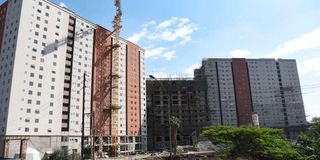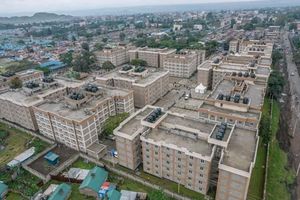
Residential houses in Nairobi's Woodley Estate.
Ambitious plans by Nairobi and Nakuru cities to upgrade decades-old county houses into modern, affordable units are facing resistance.
The county governments aim to build affordable apartments on existing county land to address the growing demand for decent housing and generate additional revenue.
But the projects have sparked controversy, particularly in Nairobi's Woodley Estate, where residents are opposing the planned relocation of 43 tenants to make way for redevelopment.
Some people residing in the 50-year-old estate are pushing back against the move.
The Woodley Residents Welfare Society claims that the county government has not fully involved them in the process.
"The county government's action infringes on our property rights. We were not consulted about any proposed developments on our houses. This is a plan by influential people to seize our properties and reallocate them to themselves and their associates. We will not accept the move," said Joseph Kang'ethe, a long-time resident.
But Nairobi Governor Johnson Sakaja assured them they would get their house back once completion is complete.
“The 43 homeowners were compensated with Sh900,000 each to pay rent elsewhere during the construction. Once the project is complete, they will return to their new homes,” Mr Sakaja said, adding that all affected homeowners were issued with allotment letters guaranteeing them ownership of units in the upgraded estate.
The Nairobi County government last week demolished houses belonging to some 43 families to pave the way for modern structures.
A Nairobi court also vacated earlier orders barring the demolition of old houses to pave the way for the modern structures. Justice Ogutu Mboya struck out a petition filed by residents but they have indicated they will appeal the ruling through their lawyer John Khaminwa.
The estate was built by British colonial mayor Sir Richard Woodley in the 1940s.
Nairobi County's redevelopment initiative is part of the broader Nairobi Regeneration and Urban Renewal Programme which targets 13 estates sitting on 4,000 acres of land.

The affordable housing project in Pangani, Nairobi. A court has blocked the government’s plan to acquire 4,272 acres of land in Athi River to build affordable housing under its Big Four agenda.
The programme plans to construct 10,000 housing units across these estates. Among the targets are Bahati, Jericho, Lumumba, Maringo, Woodley, Ziwani, Embakasi, Kariobangi North and Bondeni units.
Build new units
Apart from putting up new units, the county will also rehabilitate existing ones among them Harambee Estate. Some of these projects have stalled due to lack of funds.
The project aligns with the Nairobi Integrated Urban Development Master Plan, focusing on the redevelopment of Eastlands, and is supported by the Japan International Cooperation Agency.
Yet, the county is under scrutiny for the slow progress of similar affordable housing projects.
Members of the Nairobi County Assembly have voiced concerns over stalled projects, including Pangani and Jeevanjee, which were launched in 2018 but remain incomplete.

A Sh5 billion government-led project to redevelop houses at Pangani estate, Nairobi, on October 8, 2023.
These projects were intended to be part of the first phase of Nairobi's affordable housing initiative, targeting eight estates. So far, only two projects have seen partial progress.
Pangani, for example, which cost Sh25 billion, is finalising eight blocks on 5.2 acres of land, totalling 1,562 units.
Meanwhile, Jevanjee, formerly known as Bachelor Quarters, is constructing 1,900 units on land previously occupied by 81 houses.
The 2025-26 development plan has a projected resource gap of Sh39 billion, with the county projecting revenues of Sh42.31 billion over the period. Key to this is own source revenue, where rental income falls. The county targets Sh20.41 billion under this, while an equitable share from the National Treasury will fund the plan to the tune of Sh20.38 billion.
“The full implementation of this plan will call for a concerted effort with other development partners, including the national government and all stakeholders. The county will also leverage other financing options, including public-private partnerships, Joint ventures, grants and infrastructure/green bonds,” the county plan reads.
In Nakuru, Governor Susan Kihika has taken a more cautious approach revealing before the Senate Public Accounts Committee that her administration is in discussions with the national government and other partners to upgrade the county's aging housing stock.

The Sh600 million ultra-modern market in Bondeni, Nakuru which is currently under construction.
“We have been in talks with the national government and other partners to have the old county houses upgraded,” she said.
“We have sat with tenants and offered to find alternative accommodations to allow for the upgrade so we can construct modern, affordable units and give tenants priority when they are completed.”
The county boss, however, acknowledged the political sensitivity of the issue.
“The matter is a tricky political issue which we must handle carefully,” she added.
Sh693m in rent arrears
To address concerns, Governor Kihika recently waived Sh693 million in rent arrears owed to the county government, dispelling fears of looming evictions linked to the planned housing upgrades.
The waiver announced at a public gathering at Kamukunji grounds on September 26, targets residents in informal settlements like Kivumbini, Bondeni, and Flamingo, who have defaulted on rent payments since the start of devolution.
Residents who benefited from the waiver include those in Paul Machanga, Abongoloya, Lumumba, Kivumbini 1-4, Shauri Yako, Kaloleni A-C, Phase II, Kimathi, Flamingo, Mohammed Kahero, Moi Flats, and Ojuka Estates.
Governor Kihika emphasised the administration's commitment to supporting tenants.
“I want to assure tenants residing in county houses across Biashara, Flamingo, and Kivumbini Wards that there will be no evictions,” she said.
To streamline rent collections and reduce corruption, the Nakuru County government plans to introduce a Paybill number for cashless payments directly to county accounts.
A new lease process for current tenants will also be managed by the Bondeni Housing Office. Despite these reassurances, some residents remain sceptical.

Kivumbini estate in Nakuru town.
“We know there have been plans to have us relocate to allow for the construction of modern, affordable housing units. We cannot just accept relocating without a solid plan and engagement with the Nakuru County government,” said Jesse Kariuki, a resident of Flamingo.
Ms Mary Ndolo, who has lived in Kaloleni for over three decades, said: “We were born and raised in these houses, we cannot accept relocation. How sure are we that the affordable houses, after completion, will be given back to us?”
The county has long struggled with rent arrears running into millions of shillings.
The Auditor General in a 2017/18 report, revealed that the county was owed millions in house rent, by tenants in various estates.
According to the report, people living in Nakuru East Estates like Kivumbini, Paul Machanga and Flamingo were among those not paying monthly rent.
Tenants pay a monthly rent of between Sh400 and Sh2,500 depending on the facilities and sizes of their houses. Many tenants have defaulted on rent payments for years.
The problem was exacerbated in 2017 when former governor Kinuthia Mbugua stopped house rent payments for county estate tenants in Naivasha and Nakuru to woo voters.
Although he described the move as a “gift,” it was widely viewed as a campaign strategy. Mr Mbugua, however, lost his re-election bid.
The populations in the capital Nairobi and Nakuru Cities have been rising, compelling the administrations of the two counties to establish solid modern housing plans for the people.






